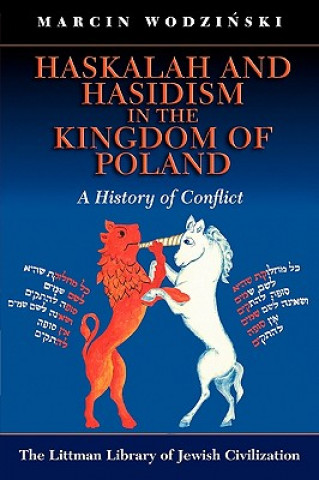
Kód: 05027185
Haskalah and Hasidism in the Kingdom of Poland
Autor Marcin Wodzinski
The conflict between Haskalah and hasidism was one of the most important forces in shaping the world of Polish Jewry for almost two centuries, but our understanding of it has long been dominated by theories based on stereotypes ra ... celý popis
- Jazyk:
 Angličtina
Angličtina - Vazba: Brožovaná
- Počet stran: 352
Nakladatelství: The Littman Library of Jewish Civilization, 2009
- Více informací o knize

1104 Kč

Skladem u dodavatele v malém množství
Odesíláme za 10-14 dnů
Potřebujete více kusů?Máte-li zájem o více kusů, prověřte, prosím, nejprve dostupnost titulu na naši zákaznické podpoře.
Přidat mezi přání
Mohlo by se vám také líbit
-
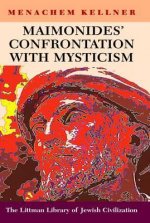
Maimonides' Confrontation with Mysticism
1104 Kč -
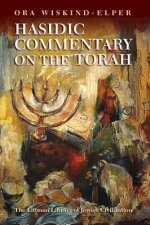
Hasidic Commentary on the Torah
1629 Kč -

Introduction to Policing and Police Powers
1974 Kč -
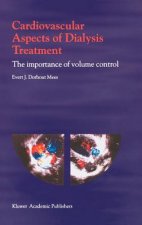
Cardiovascular Aspects of Dialysis Treatment
3313 Kč -
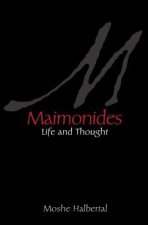
Maimonides
707 Kč -

Pious Irreverence
2500 Kč -

Prairie Empire
1102 Kč
Darujte tuto knihu ještě dnes
- Objednejte knihu a zvolte Zaslat jako dárek.
- Obratem obdržíte darovací poukaz na knihu, který můžete ihned předat obdarovanému.
- Knihu zašleme na adresu obdarovaného, o nic se nestaráte.
Více informací o knize Haskalah and Hasidism in the Kingdom of Poland
Nákupem získáte 110 bodů
 Anotace knihy
Anotace knihy
The conflict between Haskalah and hasidism was one of the most important forces in shaping the world of Polish Jewry for almost two centuries, but our understanding of it has long been dominated by theories based on stereotypes rather than detailed analysis of the available sources. In this award-winning study, Marcin Wodzinski challenges the long-established theories about the conflict by contextualizing it, principally in the Kingdom of Poland but also with regard to other parts of eastern Europe. Covering the period from the earliest anti-hasidic polemics in the late eighteenth century through to the post-Haskalah movements of the twentieth century, it follows the development of this important conflict in its central arena. Using source materials (including many hitherto unknown documents) in Polish and five other languages, Wodzinski has succeeded in reconstructing the way the conflict expressed itself. Identifying the motives, the methods, and the consequences of the conflict as it was played out in five Polish towns (Lodz, Opoczno, Piotrkow, Warsaw, and Warta), he shows that it was primarily informed by non-ideological clashes at the level of local communities rather than by high-level ideological debates. Much attention is also devoted to the general characteristics of hasidism and the Haskalah, as well as to the post-Haskalah movements. Here too Wodzinski challenges the ideologically charged assumptions of a generation of historians who refused to see the advocates of Jewish modernity in nineteenth-century Poland as an integral part of the Haskalah movement. Extensive consideration is given to the professional, social, institutional, and ideological characteristics of the Polish Haskalah as well as to its geographic extent, and to the changes the movement underwent in the course of the nineteenth century. Similar attention is given to the influence of the specific characteristics of Polish hasidism on the shape of the conflict, especially as regard the size of the movement and the evolution of hasidic communal involvement. In consequence the book presents a synthesis that offers both breadth and depth, contextualizing its subject matter within the broader domains of the European Enlightenment and Polish culture, hasidism and rabbinic culture, tsarist policy and Polish history, not to mention the ins and outs of the Haskalah itself across Europe. An extensive appendix presents translations of nineteen important and hitherto unknown sources of relevance to a nuanced understanding of many aspects of nineteenth-century Jewish history in Poland and eastern Europe more generally.
 Parametry knihy
Parametry knihy
Zařazení knihy Knihy v angličtině Humanities History Regional & national history
1104 Kč
- Plný název: Haskalah and Hasidism in the Kingdom of Poland
- Podnázev: A History of Conflict
- Autor: Marcin Wodzinski
- Jazyk:
 Angličtina
Angličtina - Vazba: Brožovaná
- Počet stran: 352
- EAN: 9781906764029
- ID: 05027185
- Nakladatelství: The Littman Library of Jewish Civilization
- Hmotnost: 495 g
- Rozměry: 234 × 156 × 18 mm
- Datum vydání: 20. August 2009
Oblíbené z jiného soudku
-

Hundred Years' War on Palestine
338 Kč -

Ethnic Cleansing of Palestine
358 Kč -

History of Japan
406 Kč -

Ten Myths About Israel
336 Kč -

Strange Death of Europe
410 Kč -

Decline and Fall of the Roman Empire
130 Kč -

Secret History
303 Kč -

God's Playground A History of Poland
1700 Kč -

Mayflower
388 Kč -

How to be a Victorian
357 Kč -

Plantagenets
334 Kč -

General's Son
427 Kč -

Iran: A Very Short Introduction
249 Kč -

Temples of Karnak
3800 Kč -

Cuneiform
276 Kč -

Twenty Years A-Growing
249 Kč -

History of Witchcraft in England from 1558 to 1718
453 Kč -

Bohemian Paris
415 Kč -

China in Africa
894 Kč -

Islandman
249 Kč -

Lancaster And York
490 Kč -

Alexiad
427 Kč -

Modern France: A Very Short Introduction
269 Kč -

Inside Hitler's Greece
513 Kč -

Diana: Her True Story - In Her Own Words
306 Kč -

The Fourth Turning
393 Kč -

The Oxford History of Ancient Egypt
383 Kč -

Churchill: The Power of Words
410 Kč -

Palestine
545 Kč -

Korean History in Maps
709 Kč -

Great Gatsby (Wisehouse Classics Edition)
409 Kč -

Viking Way
1144 Kč -

The Thirteenth Tribe
309 Kč -

My Promised Land
358 Kč -

Vanished Kingdoms
514 Kč -

Age Of Revolution
410 Kč -

Life and Death of Anne Boleyn
584 Kč -

Coming of the Third Reich
543 Kč -

Children of Ash and Elm
464 Kč -

Europe Between the Oceans
798 Kč -

Socialism Betrayed
477 Kč -

303 Squadron
464 Kč -

Ancient Celts, Second Edition
628 Kč -

Dancing in the Glory of Monsters
396 Kč -

Battle of Britain: Luftwaffe Blitz (Images of War)
606 Kč -

Age of Confucian Rule
851 Kč -

Beyond Band of Brothers
410 Kč -

Benjamin Franklin
410 Kč -

On China
462 Kč
Osobní odběr Praha, Brno a 12903 dalších
Copyright ©2008-24 nejlevnejsi-knihy.cz Všechna práva vyhrazenaSoukromíCookies


 Vrácení do měsíce
Vrácení do měsíce 571 999 099 (8-15.30h)
571 999 099 (8-15.30h)